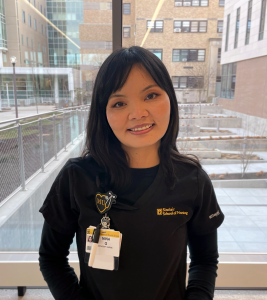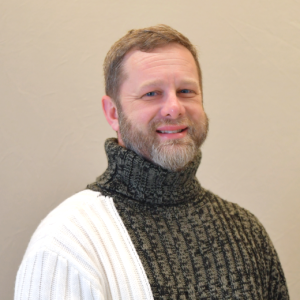Nina Graves discovered she wanted to be a nurse when she worked as an interpreter in health care. Now, she's making an impact even before graduation.
March 10, 2023

Before coming to the Sinclair School of Nursing (SSON), Nina Graves worked as an interpreter and found that she thoroughly enjoyed helping patients talk with health care providers. Not only did she feel helpful in ensuring patients got the information they needed, but she also admired how nurses and doctors composed themselves in life-changing situations. After those experiences, she decided she wanted to continue her journey in health care, but on a different path. Currently, she is working toward her BSN and will graduate this summer with plans to pursue a career in cardiac nursing.
Last semester, Nina was at MU Healthcare for a med-surg clinical and recently had her own potentially life-changing encounter with a patient. One of her favorite parts of nursing is to take time to connect with patients and she was doing just that on her first day when a patient revealed a history of substance abuse. They told her that they had taken an opioid in the past after a fracture, but after their doctor told them they no longer needed the medication, they acquired it through other means. Nina told him, “This conversation is a little serious for me, so I have to stop you there. As a nursing student, I cannot make any decisions, but I have to report what you said to my charge nurse and the people who take care of you.”
Nina, as a nursing student and health care worker, is considered a mandated reporter, which refers to members of certain occupational groups who, by law, are required to report suspected mistreatment or abuse of vulnerable populations. However, substance abuse does not fall under mandatory reporting, which means nurses must make the call themselves on what to report to their supervisors.
Clinical instructor, Vernon Welschmeyer, BSN’21, RN, CMSRN, weighs in, “While substance abuse does not fall under mandatory reporting, we teach SSON students to handle situations like Nina’s by reporting it to their primary nurse. This way, a health care team can make informed decisions and adjust a patient’s treatment plan accordingly. In this case, they may adjust a prescription to limit the quantity of medication, to prevent a potential overdose or harm to the patient and recommend a rehabilitation facility. We are proud of Nina for making this difficult decision regarding her patient’s care.” In the end, Nina hopes her reporting the conversation will help the patient in the long run.
